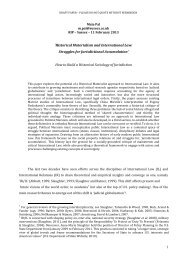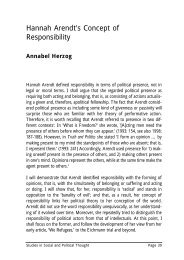Civil Society Theory and Euro-Nationalism - University of Sussex
Civil Society Theory and Euro-Nationalism - University of Sussex
Civil Society Theory and Euro-Nationalism - University of Sussex
Create successful ePaper yourself
Turn your PDF publications into a flip-book with our unique Google optimized e-Paper software.
CIVIL SOCIETY THEORY AND EURO-NATIONALISM<br />
invoke ideal or abstract models. It is being argued that recognition<br />
<strong>of</strong> the distance between the idea, or value, <strong>and</strong> its material<br />
articulation means accepting that constitutional arrangements are,<br />
<strong>of</strong> their nature, a process in continual evolution. In order for this<br />
to be a democratic <strong>and</strong> potentially more peaceful process, the<br />
implicit <strong>and</strong> polarising assumption that a clear dichotomy exists<br />
between good state nationalisms <strong>and</strong> bad ‘micronationalisms’ has<br />
to be dropped. The inherent nationalism <strong>of</strong> the contemporary state<br />
system has to be recognised. The polarisation <strong>of</strong> the relationship<br />
between universalising <strong>and</strong> differentiating tendencies for<br />
politically opportunist motives has to be ab<strong>and</strong>oned. And ways<br />
have to be found to articulate minority interests as part <strong>of</strong> the<br />
progressive transformation <strong>of</strong> the system <strong>of</strong> states.<br />
Finally, this must not be construed as the sacrifice <strong>of</strong> the majority<br />
through special treatment <strong>and</strong> concessions. A non-ideological<br />
critique <strong>of</strong> nationalism will show that in reality, <strong>and</strong> within a form<br />
<strong>of</strong> democracy which allows <strong>and</strong> foments self development, we are<br />
all non-identical minorities.<br />
The foregoing has argued that civil society theory generates a<br />
rhetoric <strong>of</strong> banal state nationalism. Paraphrasing Tortella’s<br />
description <strong>of</strong> the minority nationalisms, civil society theory might<br />
also be described as a ‘sociological abstraction with an aura <strong>of</strong><br />
philosophy <strong>and</strong> objectivity which hides its political interests’.<br />
Within the historiography, or what Fine terms the iconography, 41<br />
<strong>of</strong> civil society theory, the concept <strong>of</strong> civil society (re)emerges within<br />
grass roots mobilisation which distrusts <strong>and</strong> eschews traditional<br />
state-oriented politics. One <strong>of</strong> the key aspects <strong>of</strong> civil society theory<br />
is that, through what has been described as a process <strong>of</strong><br />
sacralisation, 42 it posits ‘civil society’ as the alternative to both the<br />
nation (understood as the font <strong>of</strong> legitimacy <strong>and</strong> focus <strong>of</strong> identity<br />
41 Ibid., p. 8.<br />
42 Ibid. Also A.D. Smith speaks <strong>of</strong> ‘a semi-ideological account <strong>of</strong> nations <strong>and</strong><br />
nationalism ... that chimes with the needs ... <strong>of</strong> a mobile, universalist intelligentsia<br />
... [<strong>and</strong>] is as much a myth, in the sense <strong>of</strong> a widely believed <strong>and</strong> dramatized tale<br />
<strong>of</strong> a sacred past which serves present needs, as the myth <strong>of</strong> nationalism itself’<br />
(Nations <strong>and</strong> <strong>Nationalism</strong> in a Global Era. Cambridge: Polity Press, 1995, p. 41).<br />
43
















